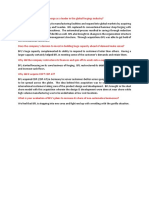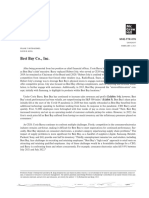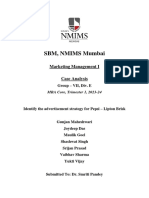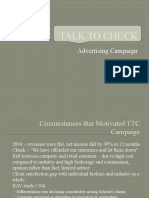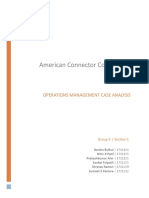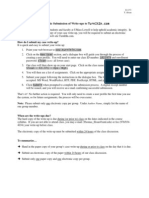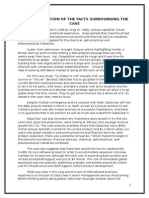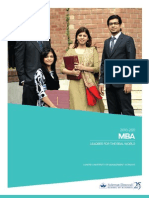Biocon Limited
Biocon Limited
Uploaded by
Mukesh SahuCopyright:
Available Formats
Biocon Limited
Biocon Limited
Uploaded by
Mukesh SahuOriginal Description:
Copyright
Available Formats
Share this document
Did you find this document useful?
Is this content inappropriate?
Copyright:
Available Formats
Biocon Limited
Biocon Limited
Uploaded by
Mukesh SahuCopyright:
Available Formats
Biocon Limited
1. Assuming Biocon receives approval for BioMAb, should it launch the drug immediately or conduct
phase 3 trials before launch? Elaborate the various elements of your action plan.
Even if the Drug Controller General of India (DCGI) grants permission for BIOMAb in fall 2006, Biocon
should still conduct phase 3 trials before launching. Both Biocon and Clinigene are new to the industry
and strong reputations have yet to be developed. Therefore, Biocon must means make sure BIOMAb is a
proven quality drug before its released. Biocon should enter the cancer pharmaceutical sector as soon
as possible to begin building a name for itself in the cancer industry by selling other generic cancer drugs
first. R&D costs may be significant, but not as much as creating drugs from scratch. This would generate
revenue and start getting Biocons name familiar in the market. Also, by waiting to launch, Biocon would
be postioned to defend BIOMAb better if and when Eribtux uses the lack of Biocons experience against
them.
By waiting to launch, BIOMAb might not be the first new drug in the head and neck cancer market,
however, Biocon will still be the first Indian company to produce a proprietary drug since Erbitux is an
existing drug with a new use.
2. How big is the current and future market opportunity in BIOMAb?
The market in India consists of both public and private sectors, 20% public sector and 80% private. India
comprises up 21% of the worlds cases of head and neck cancer and 27% of the deaths from head and
neck cancer. 85% of head and neck cancer patients are due to excessive use of tobacco and alcohol and
India has a high population use of tobacco and alcohol.
Venky Rao, senior manager of business strategy, expects that 95% of the patients using BIOMAb would
be self-paying. The cost of the drug is a main determinant on the possible market for the drug as most
citizens of India are likely unable to afford expensive health care, however the potential is great as the
economy is growing in India by about 9% annually, in addition to a population growth of 1.4%.
The market for BIOMAb in India is tremendous based on a number of variables. Educating the
customers, targeting government and insurance companies, and the price of BIOMAb will all develop
the market for the drug and ultimately determine how many customers BioCon is able to secure. Rao
expected that doctors are more willing to use BIOMAb with radio or chemotherapy during advanced
stages of cancer and estimates that 20,000 of the 190,000 patients fall into this category.
The future of BIOMAb is very strong as phase 2 trials showed 100% success rate when used with
radiotherapy and chemotherapy. The market for head and neck patients is approximately 190,000
customers at 6 doses per customer. Given the 7.6 million deaths in 2005 from cancer and expected
growth to 9 million in 2015, following with 11.4 million in 2030, mathematically the growth in cancer
market is about 18% from 2005-2015 and 26% from 2015-2030. BIOMAb can expect this same market
growth in terms of percentage growth and perhaps more given off-label usage of this drug.
3. Who is the buyer for BIOMAb? What is the decision-making unit in this case? What are the benefits
that each member of the decision-making unit seeks from BIOMAb?
The buyers for BIOMAb are Indian patients who will utilize the drug to treat head and neck cancer and
possibly patients with other indications for off-label usage. However, Biocon will not be marketing
directly to patients and will have to utilize a sales team approach to reach out and educate oncologists
in order for BIOMAb to ultimately reach the patients. To better market to patients and help ease the
anxiety of having a life-threatening disease, Biocon will provide support by having a sales rep spend a
few hours explaining the product and its usage, information on their website, consumer helplines, sales
force, and direct consumer advertising.
The decision-making unit will focus on educating the leading oncologists in India (less 100 total) on
BIOMAb. Patients trust the advice from their oncologist and when the superiority of BIOMAb over
different drugs is evident, the choice to use BIOMAb is an easy one. The government-sponsored public
sector will also be a decision making unit provided they cover reimbursements for cancer medications.
The benefits to the patient will be the successful treatment of their cancer. The benefit for the
oncologist will be to help their patients get well and to allow them to see more patients as valuable time
spent educating each patient on the drug use and strategy will be handled by Biocon. The benefit for the
government sponsored public sector is a potential long term savings as BIOMAb boasts lower amount of
side effects and a predictable and finite treatment protocol that will eliminate the need for continuous
cancer treatment with ongoing prescriptions like Erbitux.
4. Develop a detailed launch plan for BIOMAb. Provide your rationale for the product portfolio, pricing,
channel, and communication decisions.
The launch plan for BIOMAb is to conduct phase 3 testing first to ensure product safety and
effectiveness. Waiting for phase 3 completion will prove to the industry that Biocon is not a fly by
night company and provides excellent products with the people of Indias best interest in mind. Also,
during the time it takes for Biocon to complete phase 3 trials, they can utilize R&D departments to
develop other generic cancer drugs to compliment BIOMAb. Once the phase 3 testing has been
completed, the cancer drug portfolio, including BIOMAb will be released directly to the consumer with a
full marketing force promoting the products to leading oncologists in India. Providing a portfolio of
products to market in India is necessary to bolster awareness of Biocons entry into the cancer drug
market and to create multiple reasons for Biocon to reach out to leading oncologists on multiple
occasions. Marketing the product to the leading oncologists is the main priority as patients rarely
question the specialist prescribing medications. Win over the specialists and the patients will purchase
the drugs provided the price point makes sense.
R&D costs will be significant thus the cost structure for the drug must be priced at a point where BioCon
can recover those and create profits for the company. BIOMAb does not want to offer a pricing structure
that is too low and thus creating a scenario wherein doctors and consumers believe the product itself is
not of value. Given that the cost of goods (25%), R&D (15%), and marketing costs (25-30%) comprise
approximately 70% of the cost to get the product sold, 30% of revenues are left for profits. To recoup
the cost of the investment, Biocon will need to sell approximately $83.5 million worth of product at 30%
margins. Given the aforementioned data, if Biocon is able to capture 1,900 patients per year at 6 doses
of BIOMAb per patient, then BIOMAb will need to be priced at least at $7,325 to recover its initial
investment within the first year. Pricing one dose of BIOMAb at $4,500 will allow BioCon to recover the
$25 million for the manufacturing plant within 2 years and allows the product to be priced competitively
against Erbitux.
Once the demand for this product is demonstrated, the next objective is getting the product
into the hands of the consumer. Channels of distribution must take into account that the product must
be refrigerated at all times. Pharmacies typically do not have the ability to refrigerate their drugs thus,
BIOMAb will be couriered overnight to the oncologist. Selling directly reduces costs and has a significant
economic benefit to the patient. The slight drawback is that the product would not be readily available
and the doctors office would have to plan at least a day in advance to ensure that BIOMAb was on hand
the day of the patients appointment. BIOMAb will be sold directly to the patients which means the
oncologist will reap the convenience of not having to stock the drug and the patient will get a lower
price.
Detailing is the means of by which the benefits of BIOMAb will be communicated to oncologists.
Traditional detailing will not be sufficient as this drug treats a life-threatening disease. Basak explains,
We could provide information, help, and support to our patients through our web site, consumer
helplines, our sales force, and direct to consumer advertising (pg. 11). The assistance to doctors is
crucial for this product as patients facing this disease will undoubtedly experience times of high anxiety
and the ability to calm them down through the explanation of BIOMAb will provide great value to the
doctors and patients. Sales reps can spend up to two to three hours with patients explaining the
produce and its usage saving valuable time for the doctors.
5. How has Biocons strategy and positioning evolved over the years? What role does BIOMAb play in
Biocons overall strategy?
Initially, Biocon started out as a mere producer of enzymes for the European and US food processing
industry but CEO Dr. Mazumber-Shaw had grand designs to make Biocon an international player in the
global biopharmaceutical market all along. To meet this lofty goal, Biocon had to take calculated risks in
evolving from enzyme production to statins to insulin until the ultimate goal of entering into the
proprietary drug arena. The strategy was always long term in thinking and never did Dr. Mazumber-
Shaw move too quickly into a new level of complexity or risk the companys overall health.
Biocon, fresh off a hugely successful IPO in March 2004, was perfectly positioned to step into the final
level of evolution in becoming a fully integrated biotech company: creation of proprietary drugs. The
cancer drug BIOMAb is the key to successfully entering into this market. Biocon licensed the cancer drug
from the Cuban company CIMAB to develop and market the molecule on the Indian subcontinent.
BIOMAb was a perfect entry product for Biocon for several reasons. First, it allowed Biocon to learn
about mammalian technology, arguably the future of the biotech industry. Second, it gave Biocon an
opportunity to develop essential skills for ensuring the long-term success of the company, namely new
research and marketing capabilities. Thirdy, BIOMAb afforded Biocon the positive brand positioning of
being the first Indian company to launch a proprietary drug in India. Lastly, and most importantly,
BIOMAb provided Biocon with the opportunity to enter into the proprietary drug arena with an
immediate win. Simply put, BIOMAb worked.
Ultimately, BIOMAb gives Biocon the ability to realize Dr. Mazumber-Shaws goal of becoming a globally
recognized player in the biotech industry. However, it must be stated that the ability to capitalize on the
BIOMAb opportunity is a product of Biocons calculated strategy to gradually increase its capabilities and
breadth of offerings through careful, yet systematic, risks.
You might also like
- Sirtris Pharmaceuticals: Living Healthier, LongerDocument3 pagesSirtris Pharmaceuticals: Living Healthier, LongerAkshay PatilNo ratings yet
- Buy Zimbabwe Brand Manual FinalDocument10 pagesBuy Zimbabwe Brand Manual FinalRobert Garai MugandaNo ratings yet
- Group 3 - Optical DistortionDocument15 pagesGroup 3 - Optical DistortionsrivatsaNo ratings yet
- Nano SolarDocument5 pagesNano SolarAkwasNo ratings yet
- Indian School of Business Decision Models and Optimization Assignment 1Document11 pagesIndian School of Business Decision Models and Optimization Assignment 1NANo ratings yet
- Sound System Design and Installation AlectroDocument6 pagesSound System Design and Installation AlectroVictor D'souza100% (1)
- Oplan Linis Kanal 2022 - 2023Document8 pagesOplan Linis Kanal 2022 - 2023Paul Kendrick DacumosNo ratings yet
- Land Patents & Allodial TitlesDocument12 pagesLand Patents & Allodial TitlesAnonymous100% (8)
- 1Document4 pages1Mayank RajNo ratings yet
- Clean Edge RazorDocument2 pagesClean Edge RazorSalil AggarwalNo ratings yet
- The Birth of The VCR IndustryDocument2 pagesThe Birth of The VCR IndustryQuỳnh Smile100% (1)
- Arogya Parivar Case Analysis Group 4 Sec - CDocument5 pagesArogya Parivar Case Analysis Group 4 Sec - CMuktesh SinghNo ratings yet
- Medicult Case Discussion QuestionsDocument1 pageMedicult Case Discussion QuestionsAhmad NazirNo ratings yet
- GRE Pipe Design GuideDocument36 pagesGRE Pipe Design GuideSandeep Bhatia100% (1)
- Jianyuan Medical Technology Co LTD JSB 1200 Operations ManualDocument18 pagesJianyuan Medical Technology Co LTD JSB 1200 Operations Manualtravieso112No ratings yet
- Biocon Case StudyDocument12 pagesBiocon Case StudyVaibhavee KatialNo ratings yet
- Biocon CaseDocument2 pagesBiocon CaseDinaraNo ratings yet
- BIOCON: Launching A New Cancer Drug in India: Click To Edit Master Subtitle StyleDocument12 pagesBIOCON: Launching A New Cancer Drug in India: Click To Edit Master Subtitle StyleAbegail DmelloNo ratings yet
- Sealed Air Corporation's Leveraged Recapitalization (A)Document7 pagesSealed Air Corporation's Leveraged Recapitalization (A)Jyoti Gupta0% (1)
- Question-Set 2: How Did You Handle The Ambiguity in Your Decision-Making? What WasDocument6 pagesQuestion-Set 2: How Did You Handle The Ambiguity in Your Decision-Making? What WasishaNo ratings yet
- Bharat Forge Limited - Global Leadership - Submission by Group 3Document1 pageBharat Forge Limited - Global Leadership - Submission by Group 3Murali Dharan100% (1)
- Philips and Matsushita CompanyDocument5 pagesPhilips and Matsushita CompanyAssignmentLab.comNo ratings yet
- 02 Kunst 3500Document9 pages02 Kunst 3500KuntalDekaBaruah0% (1)
- Auction at Casturn SystemsDocument3 pagesAuction at Casturn Systemsashwini patilNo ratings yet
- Best Buy Inc CaseDocument21 pagesBest Buy Inc CaseFred MuthokaNo ratings yet
- Cottle Taylor Case StudyDocument10 pagesCottle Taylor Case StudyParth DhingraNo ratings yet
- Nypro IncDocument13 pagesNypro IncRendy Fadhlan PutraNo ratings yet
- Sealed Air Corporation's Leveraged RecapitalizationDocument7 pagesSealed Air Corporation's Leveraged RecapitalizationKumarNo ratings yet
- Computron IncDocument7 pagesComputron IncJD_04100% (1)
- Group3 Spacemaker PlusDocument3 pagesGroup3 Spacemaker PlusSabyasachi SahuNo ratings yet
- Practice Set 3Document2 pagesPractice Set 3bala sanchitNo ratings yet
- Culinarian by ShamDocument2 pagesCulinarian by ShamSham Jonglertjanya รักในหลวง100% (1)
- Propecia CaseDocument9 pagesPropecia CaseWawan JuliantoNo ratings yet
- Sample Problems-DMOPDocument5 pagesSample Problems-DMOPChakri MunagalaNo ratings yet
- Ortho 500 Sales StrategyDocument4 pagesOrtho 500 Sales StrategyAparna SinghNo ratings yet
- Chapter 15 MMAAADocument26 pagesChapter 15 MMAAAMoidin AfsanNo ratings yet
- Assignment: Individual Assignment 4 - Philips: Lighting Up Eden GardensDocument5 pagesAssignment: Individual Assignment 4 - Philips: Lighting Up Eden GardensVinayNo ratings yet
- ASSIGNMENT - Health City Cayman Islands - Ritika SharmaDocument2 pagesASSIGNMENT - Health City Cayman Islands - Ritika SharmaRitika SharmaNo ratings yet
- Pepsi Lipton Brisk Case Analysis - Group - VIIDocument3 pagesPepsi Lipton Brisk Case Analysis - Group - VIIGunjan MaheshwariNo ratings yet
- Q3Document2 pagesQ3Satyam100% (3)
- Talk To ChuckDocument7 pagesTalk To ChuckRadhika BhaskaranNo ratings yet
- PGP MAJVCG 2019-20 S3 Unrelated Diversification PDFDocument22 pagesPGP MAJVCG 2019-20 S3 Unrelated Diversification PDFBschool caseNo ratings yet
- Booz Allen Case StudyDocument4 pagesBooz Allen Case StudysmitaNo ratings yet
- Barco Projection SystemsDocument17 pagesBarco Projection SystemsJaideep ChauhanNo ratings yet
- American Connector - Group 5 - Sec C PDFDocument8 pagesAmerican Connector - Group 5 - Sec C PDFHarshal WankhedeNo ratings yet
- Atlantic ComputerDocument4 pagesAtlantic ComputerwiwoapriliaNo ratings yet
- Unit 5 - Medi-Cult - Case StudyDocument11 pagesUnit 5 - Medi-Cult - Case StudyIqbal ZaforNo ratings yet
- The Fashion ChannelDocument4 pagesThe Fashion ChannelVarun LalaNo ratings yet
- Virgin Mobile USA Pricing For The Very First TimeDocument19 pagesVirgin Mobile USA Pricing For The Very First TimeAkhil ManglaNo ratings yet
- Optical DistortionDocument15 pagesOptical DistortionPradyoth C John0% (1)
- Week 4 Assignment 1Document2 pagesWeek 4 Assignment 1Boroon MahantaNo ratings yet
- Eco 4Document5 pagesEco 4SamidhaSinghNo ratings yet
- Lucent Technologies CaseDocument9 pagesLucent Technologies CaseAndy VibgyorNo ratings yet
- Jetblue Airways 609046-PDF-ENG - Case StudyDocument9 pagesJetblue Airways 609046-PDF-ENG - Case StudyvikramNo ratings yet
- GLEC Assignment-Country Report (Spain)Document15 pagesGLEC Assignment-Country Report (Spain)Sohil AggarwalNo ratings yet
- Group30 Assignment 1Document7 pagesGroup30 Assignment 1Rajat GargNo ratings yet
- Biopure CaseDocument5 pagesBiopure Casemanish kumarNo ratings yet
- Medicines Company Case SlidesDocument4 pagesMedicines Company Case Slidesapi-573144944No ratings yet
- CASE STUDY3 Cooper PharmaceuticalsDocument7 pagesCASE STUDY3 Cooper PharmaceuticalsAhmir BahduNo ratings yet
- Benihana Case Questions s07Document2 pagesBenihana Case Questions s07krishnathinks0% (1)
- Aditya Baijal - Charles Schwab & Co IncDocument11 pagesAditya Baijal - Charles Schwab & Co IncRohit JhaNo ratings yet
- Business To Business Marketing: Section - A Group No. - 08Document2 pagesBusiness To Business Marketing: Section - A Group No. - 08Nirosha NagarajNo ratings yet
- Krispy Naturals Case WriteupDocument13 pagesKrispy Naturals Case WriteupVivek Anandan100% (3)
- Principle of Management. Case StudyDocument15 pagesPrinciple of Management. Case StudyYan Gu33% (3)
- Go Global or Not FINALDocument8 pagesGo Global or Not FINALKavitha MarappanNo ratings yet
- Biocon KuriousDocument13 pagesBiocon KuriousSaikat RoyNo ratings yet
- Despite The Fall of Communism, We Are Still Living in Planned EconomyDocument12 pagesDespite The Fall of Communism, We Are Still Living in Planned EconomyMukesh SahuNo ratings yet
- FRM Assignment: Submitted By: Mukesh Sahu (NMP22) Manush Maken (NMP19) Abhishek Sinha (NMP39)Document4 pagesFRM Assignment: Submitted By: Mukesh Sahu (NMP22) Manush Maken (NMP19) Abhishek Sinha (NMP39)Mukesh SahuNo ratings yet
- Frequencies: Output Created Comments InputDocument79 pagesFrequencies: Output Created Comments InputMukesh SahuNo ratings yet
- NEMI2Document4 pagesNEMI2Mukesh SahuNo ratings yet
- Marketing TitliDocument3 pagesMarketing TitliMukesh SahuNo ratings yet
- Marginal Analysis For Optimal DecisionsDocument13 pagesMarginal Analysis For Optimal DecisionsMukesh Sahu100% (1)
- AC Nielsen UpdatedDocument22 pagesAC Nielsen UpdatedMukesh SahuNo ratings yet
- Business PlanDocument13 pagesBusiness PlanMhakeeh ParkerNo ratings yet
- PPTDocument14 pagesPPTDr.Amitkumar RaiNo ratings yet
- Quotation Electrical Items HVPNL ProjectDocument4 pagesQuotation Electrical Items HVPNL ProjectSharafat AliNo ratings yet
- Planning Requirements For Heliports and Helicopter Landing SitesDocument5 pagesPlanning Requirements For Heliports and Helicopter Landing SitesMuralidharan ShanmugamNo ratings yet
- Wild Muscle Grass-fed, A2 Organic Whey Protein with Creatine (Patented) DREXSPORTDocument1 pageWild Muscle Grass-fed, A2 Organic Whey Protein with Creatine (Patented) DREXSPORTKrishnaKumarDeepNo ratings yet
- 1 Defining Marketing For The New RealitiesDocument14 pages1 Defining Marketing For The New RealitiesNishat Anjum Haque100% (1)
- QO-D-7.1-2 Ver-7.0 - Change of Specificationof ItemsDocument4 pagesQO-D-7.1-2 Ver-7.0 - Change of Specificationof ItemsSaugata HalderNo ratings yet
- Sampling Theorem: Principle of Communication Lab ManualDocument12 pagesSampling Theorem: Principle of Communication Lab Manualعمیر بن اصغرNo ratings yet
- CH 02Document48 pagesCH 02Eyael ShimleasNo ratings yet
- ASKING - DESCRIBING JOB ExerciseDocument2 pagesASKING - DESCRIBING JOB ExerciseyppnhtrenggalekNo ratings yet
- Mẫu cover letter ngành IT, công nghệ thông tinDocument2 pagesMẫu cover letter ngành IT, công nghệ thông tinqueanhnguyNo ratings yet
- 7 - Ca 80Document2 pages7 - Ca 80Rady CadsNo ratings yet
- Programming Shote NotesDocument4 pagesProgramming Shote Notesjoeyaemmy21No ratings yet
- Mba BrochureDocument20 pagesMba BrochureMehmud HusainNo ratings yet
- 03 16 19Document124 pages03 16 19Scpo Presinto DosNo ratings yet
- Soal 2Document16 pagesSoal 2ahs_djNo ratings yet
- RF & E2e Expert Lte - Volte - 5g NRDocument2 pagesRF & E2e Expert Lte - Volte - 5g NRTeamNo ratings yet
- How To Conduct Bunker SurveyDocument2 pagesHow To Conduct Bunker SurveyAbdelkrim TayebiNo ratings yet
- FM 55-17 Chapter 8 Loading and Discharging Cargo VesselsDocument52 pagesFM 55-17 Chapter 8 Loading and Discharging Cargo VesselsRishabh SinghNo ratings yet
- Annual Anniversary Bonus 5 Crore FinalDocument1 pageAnnual Anniversary Bonus 5 Crore FinalManish KangraNo ratings yet
- Customer ServicesDocument19 pagesCustomer Servicesdyeaayaser5No ratings yet
- Computing Capacitance: Created in COMSOL Multiphysics 5.5Document16 pagesComputing Capacitance: Created in COMSOL Multiphysics 5.5Adnen Guedria100% (1)
- Minecraft CommandDocument7 pagesMinecraft CommandsteveNo ratings yet
- AWS S3 - Integration - of - SFGDocument8 pagesAWS S3 - Integration - of - SFGOscar Duran LopezNo ratings yet




















